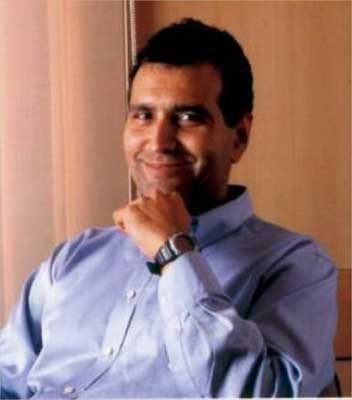January 16, 2009 Bribery in the World Bank's lending methods is as rampant as ever, says a former Bank official who has written a book on this corruption. Steve Berkman contends that Indian IT majors Satyam [Get Quote] and Wipro [Get Quote], who were barred from World Bank projects for offering their stock to Bank officials, represent a miniscule problem compared to the kickbacks and commissions that go to government officials for approval of Bank projects.
Berkman, who was an advisor to various project teams within the Bank on human resource issues and capacity building, retired from the Bank in 2002. He is the author of an expose on corruption in this multilateral institution titled, The World Bank and the Gods of Lending, based on his 16-year experience auditing Bank projects, including the $800 million loan to health sector projects in India.
While most of his experiences were in Africa and Latin America, he said the corruption "I've seen there (in India) is no different than what I've seen in Africa and other places."
In an interview with rediff India Abroad, Berkman said he strongly believes that Paul Wolfowitz was pushed out of his position as World Bank president after an entrenched bureaucracy at the Bank disliked his anti-corruption campaign and not because of the mini-scandal about his girlfriend, which "was more of a side-show."
The problems for Wolfowitz -- a former Bush administration official -- began in July 2005 when Berkman said he suspended the massive Bank loan for health sector projects in India because of allegations of corruption.
"My experience has been that -- and again, one of the things I was trying to shed some light on in my book -- is that almost always (corruption) emanated from government officials in these developing countries. In my experience, they have always been the catalysts for the corruption and the fraud."
Berkman, now 75 and living a retired life in Leesburg, Virginia, near Washington, DC, says the gods of lending are the international bureaucrats who run the Bank and are the ones who conspired to nail Wolfowitz using the mini-scandal with his girlfriend to call for his ouster.
"Quite often," he argued, "everybody seems to be talking about the companies that bribe these officials, but what never seems to come out is that in fact, it is the officials who are the catalysts for this and they are the ones that are more of less coercing the business. That if you want a contract you have to pay us -- that kind of thing."
In most developing countries, Berkman said, "the spectre of corruption throughout the governments in these countries -- I mean nothing is done in some countries at all for the benefit of the people. It is merely for the benefit of the people who are running the show."
"But as far as the Bank staff goes," Berkman said, "for many years, I would have never believed that the Bank staff were also corrupt, but since the early 1990s, I think it has become obvious that we have some bad apples too."
In his book, in a scathing castigation of senior Bank managers and board members -- the so-called gods of lending -- he writes that 'they have created the myth that they are the "cutting edge" of development, while they hide the appalling number of failures within the Bank's portfolio -- failures that enrich the government elites of the Third World while creating mounds of debt that cannot be repaid.'
According to Berkman, 'It is this single truth that exposes the hypocrisy of the whole business: The Bank pretends it is lending for noble purposes, while the borrowers pretend they will put the money to good use.'
Instead, he writes, how Bank funds are regularly 'placed in the hands of officials with a history of looting national treasures.'
In the case of the $800 million loan to health sector projects in India, a team of investigators found dummy companies that were paid by the Bank for products and services that were never delivered and a plethora of bribes and kickbacks that went into the pockets of senior government officials. This was the basis of Wolfowitz's suspension of the loan to India.
In the wake of allegations that by holding up a follow-up loan until the discrepancies in the earlier loan had been fully investigated and fixed he was 'depriving the poor of needed health care,' and that his actions smacked of political considerations, Wolfowitz told Newsmax that 'The India example is particularly interesting because it refutes many of the objections that were commonly raised against the anti-corruption efforts.'
While acknowledging that India was indeed a close strategic partner of the US and a shining example of a successful developing democracy, Wolfowitz told Newsmax that it 'didn't make it right to turn a blind eye to corruption in World Bank health loans that were actually making people sick,' because tainted pharmaceuticals had been bought by Bank funds and distributed to the public.
At the time a senior Bank official told rediff India Abroad that when Wolfowitz had written to then Indian finance minister Palaniappan Chidambaram about the alleged corruption and the Bank's concern over corruption in India projects, an angry Chidambaram, irritated by what he believed was the Bank president's patronising tone, had curtly responded that India was as concerned or more about corruption and implying that New Delhi did not need lessons about fighting corruption from 'a holier than thou' Wolfowitz.
India is the largest beneficiary of World Bank lending.
In the interview, Berkman acknowledged that since he left the Bank, it had "done a lot in terms of fighting corruption and dealing with it, but at the end of the day, I remain convinced that as much money is being stolen now through bribes and kickbacks and embezzlement as there was 10, 15 years ago."
He said he did not believe "there has been any change although the Bank now talks openly about corruption and has taken some steps to deal with it."
"I would be willing to bet that there is more money being stolen now than was stolen 10, 15 years ago," he added.
In the wake of the Bank banning Satyam, Wipro and Megasoft Consultants Ltd for 'providing improper benefits to bank staff,' Berkman acknowledged that firms vying for Bank contracts may have devised new ways of bribing Bank officials through the offering of shares during Initial Public Offers and such.
"There are always ways to get around the system, but I don't see any big fish being caught and that's troublesome," he said.
Berkman said the IPO offerings to Bank officials were "the least of the Bank's problems. At the end of the day, whatever they may have gotten with stock options or whatever, I think is nothing compared to the rampant corruption that is being practiced on the Bank's lending operations."
"If one would just take 10 percent as the rate of corruption on Bank-funded projects -- I think last year they disbursed almost $25 billion -- then 10 percent is $2.5 billion," Berkman said, "and in many countries the figure is much higher. When I worked in Nigeria, it was closer to 40 percent and most likely still is. That's an awful lot of money."
"So, in terms of where the Bank has come in the last 10 years, I feel that they have made some progress, but they still have a very long way to go -- people are still robbing them blind."
While senior Bank officials declare that things have changed and corruption is not as rampant as it was, Berkman said, "my observations lead me to conclude that things haven't changed at all. In fact, in private conversations with a number of people who are still there, the general consensus is that things are worse -- I mean worse in the sense that they still circle the wagons and they are more concerned with appearing to fight corruption than in doing anything about it."
Although making the case that Wolfowitz was forced out because he came up against the 'gods of lending' with his anti-corruption efforts, Berkman said, "Wolfowitz was a bad choice anyway. I mean he came to the Bank with a lot of baggage. Let uss face it. He was not popular to begin with and then he touched a very sensitive nerve at the Bank."
 With this cut all new floating rate loans upto Rs30 lakhs are available at 9.75 per cent the same level as they were in 2006. Also loans above Rs30 lakh will be at 10.75 per cent
With this cut all new floating rate loans upto Rs30 lakhs are available at 9.75 per cent the same level as they were in 2006. Also loans above Rs30 lakh will be at 10.75 per cent


